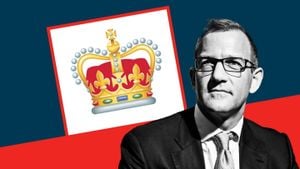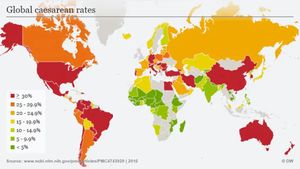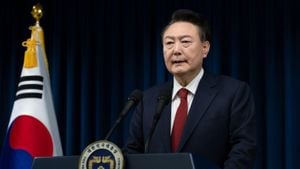With the 2025 federal election drawing near, political dynamics in Germany are shifting rapidly, and the parties are bracing for what could be one of the most intense campaigns the nation has seen. The continued fluctuations in polling data not only reflect the changing sentiments among voters but also raise questions about what direction the country might take and which parties will rise or fall as the elections approach.
Recent polling data from INSA has revealed some startling shifts, particularly for the Alternative für Deutschland (AfD). The far-right party, led by Alice Weidel, is seeing its support increase significantly, now polling at around 20%—a level not achieved since before the last election. This surge has the political establishment, especially figures like Friedrich Merz of the CDU and current Chancellor Olaf Scholz from the SPD, concerned about the potential for dramatic changes post-election.
Weidel's position as the AfD's candidate could be pivotal. According to the latest INSA survey, she is tied with Merz at 21% if the Chancellor candidates were directly elected. Scholz is trailing with only 16%, and Robert Habeck of the Greens sits at 13%, causing alarm within the traditional parties. Hermann Binkert of INSA has pointed out the evident shift: "There's movement in the political mood. If the SPD, FDP, and AfD continue to rise, it will be dangerous for the CDU/CSU." This reflects how the AfD is effectively attracting voters, especially those who are disillusioned with migration policies hailed by their traditional parties.
The Union, with Merz at the helm, has expressed confidence amid these rising tides but acknowledges the need to win over swing voters—those who often shift their allegiance between parties from one election to the next. Speaking on the possibility of forming a coalition with the Greens, Merz has changed his earlier public sentiment, now stating, “The parties of the center, including the Greens, must certainly remain cooperable and at the end of the day coalition capable.” This nuanced approach is noteworthy especially considering the backlash Merz has faced from within his own party, particularly from CSU leader Markus Söder.
The Ampel coalition, consisting of SPD, Greens, and FDP, has been termed ‘history’ following Scholz’s announcement of the forthcoming vote of confidence. The challenge is particularly acute for the governing parties, facing significant erosion of support as indicated by recent nationwide surveys. Between the three parties, the SPD, which once found itself leading, is now struggling to keep up, holding only around 15% of the electorate’s favor, with the Greens and FDP also lagging behind.
Polling data demonstrate the downward trend of the Ampel coalition following the departure of key figures, like the FDP's Christian Lindner, who resigned, leaving the coalition seemingly fragile without the necessary seats to maintain influence. Even with recent marginal recoveries for the SPD, they only see about 17%, showing the uphill battle they face leading up to the election slated for February 2025.
Voter sentiments will also be impacted by the new party BSW, led by Sahra Wagenknecht, which has quickly garnered attention, hovering just above the 5% barrier needed to enter the Bundestag. The tumultuous period leading toward the February elections raises the stakes higher than ever for all involved. According to polling averages compiled by major institutes, the CDU alone is expected to capture over 30% of the votes if the election were held tomorrow, trumping the AfD's significant surge.
Friedrich Merz remains undeterred by his dwindling lead, opting instead to double down on his strategy to court disillusioned voters with promises of bipartisanship. Even as the latest INSA data reflects the criticism aimed at his party’s proposals, particularly around funding for tax cuts, he insists on the potential economic upturn resulting from reforms aimed at curbing welfare expenditures.
“It’s necessary for us to reach not just our core constituency, but also to pull those switch voters over to our side,” he remarked, emphasizing the Union’s intentions to capture those who may feel neglected by current leadership.
The dynamics among the parties are complex, also dictated by stark contrasts with the AfD, which continuously positions itself as the viable opposition, particularly on controversial subjects such as immigration and asylum policy, rallying voters dissatisfied with the traditional parties. Surveys show many swing voters are wary of the SPD’s direction, pushing them toward the extremes, particularly as the AfD capitalizes on these concerns.
Following months of contention and political wrangling, Scholz’s loss of the vote of confidence marks the shift toward early elections: another transformation to the political status quo. The ballot, originally slated for late September, is now rescheduled for February 23, 2025. This abrupt shift has left voters wondering about the future as the parties start laying out their platforms.
The electoral climate remains volatile, with uncertainty looming. Only time will tell how these various elements will culminate as voters prepare to make their voices heard once again. And as they gear up for campaign season, intently watching for shifts and developments, there’s no denying the stakes are as high as ever.
Looking toward the future, each party will need to navigate their strategies carefully to not only maintain their base but also to effectively reach out to those on the fringe. The upcoming season will see key figures like Scholz, Merz, Weidel, and Habeck take the forefront, vying for the trust of over 60 million eligible voters committed to shaping the next chapter of Germany’s governance.



